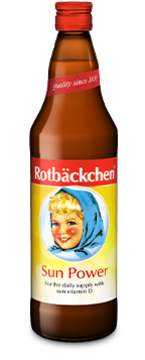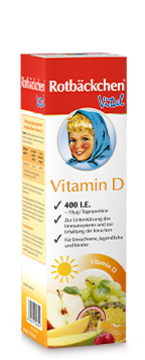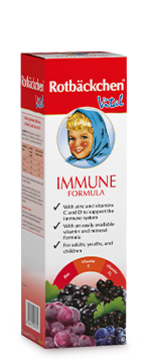Vitamin D
Vitamin D is the vitamin your body produces from sunlight while taking a walk in the park or reading on the balcony. Also called the “sun vitamin”, vitamin D in involved in various processes in the body. A sufficient supply of vitamin D is particularly important for your children. Here you can find the right dose.
What is vitamin D?

Vitamin D is not really a vitamin. Vitamins are defined as substances that the body cannot produce in sufficient quantities itself and must be supplied through food. You can make vitamin D yourself with the help of the sun. Because the body converts vitamin D into calcitriol, a hormone, it is really a “prohormone”. However, for practical and historical reasons, it is commonly called vitamin D.
Other living things can produce vitamin D3 themselves. This is why some of your vitamin D needs can be met with animal food. However, since the concentration in most products is very low, the body ultimately must cover 80-90% of its need through sunlight by synthesising it through the skin.
Inhaltsverzeichnis
Short chemistry excursion: Vitamin D synthesis
How can your body make vitamin D3 from sunlight? This happens in several stages, in which different forms of vitamin D3 are produced. When sunlight hits your skin, it reacts there with 7-dehydrocholesterol, which then forms vitamin D3, known as cholecalciferol in technical jargon. This is a chemical compound from the secosteroid group. Cholecalciferol is then converted to calcidiol in the liver and finally to calcitriol, a hormone, in the kidneys.
The effect of vitamin D
The chemical names of the vitamin D3 forms, cholecalciferol and calcitriol, tell you something about the effects of vitamin D3; more precisely, the term “calci”, because it helps absorb and utilize calcium, contributing to healthy calcium levels in the blood. Moreover, vitamin D helps maintain your bones. Children explicitly need vitamin D for healthy bone growth.
So, extended hours playing in sunshine are beneficial – with proper sun protection. However, the sun vitamin is not only important for children but also the elderly because it helps reduce the risk of falling, which is associated with postural instability and muscle weakness. Falls are a risk factor for bone fractures in men and women aged 60 and over but can be minimised by strong bones.
Vitamin D also plays an important role because it helps to maintain healthy immune system function in both children and adults. The body’s immune system protects our health; however, it needs to be supplied with vitamins and minerals year-round. As part of a balanced and varied diet, many sources of vitamin D can cover your needs and keep your immune system fit.
Your daily vitamin D requirements
![[Translate to Englisch:] Strahlende Frau beim ernten auf dem Feld [Translate to Englisch:] Strahlende Frau beim ernten auf dem Feld](https://www.rotbaeckchen.de/fileadmin/_processed_/6/7/csm_rotbaeckchen-vitamin-D-03_a5a7e9f390.jpg)
Contrary to previous beliefs, daily vitamin D requirements do not depend on age or gender. For example, according to estimates by the German Society for Nutrition (DGE), everyone needs a 25-hydroxyvitamin D serum concentration of around 50 nmol/l (nanomole per litre) of vitamin D from the first year of life.
This concentration can be achieved through a balanced and varied diet in combination with sufficient sunlight through “endogenous synthesis”. Did you know that in Germany the sun is not strong enough in the months from October to March to ensure an adequate supply of vitamin D? If the body can replenish its vitamin D stores sufficiently in summer, this is not a problem. However, you should be careful about your diet in winter and check your vitamin D levels if necessary.
By the way: an overdose through the formation of vitamin D by the skin is not possible, but of course you should still not overdo it with sunbathing to avoid sunburn. In the absence of endogenous synthesis, the DGE has established estimates for an adequate vitamin D intake.
| Age | Vitamin D requirements in absence of endogenous synthesis µg/day |
|---|---|
| Children between 1 and 15 years | 20 µg |
| Youth and adults between 15 and 65 years | 20 µg |
| Adults 65 years and above | 20 µg |
| Pregnant women | 20 µg |
| Breastfeeding women | 20 µg |
Why is vitamin D so important for children?
Your little ones are in a growth phase in which the bone structure develops decisively. Vitamin D with its importance for calcium intake plays an important role here. Children therefore need vitamin D and calcium for normal bone growth and for normal bone development. For this reason, babies usually receive vitamin D prophylaxis and are supplied with vitamin D preparations daily.
Vitamin D deficiency in older children is usually connected to leisure activity, which is increasingly spend indoors and not outdoors in summer and sunny weather. Therefore, their year-round supply of sufficient sunlight, which is already weak in Germany, is further diminished. So, regularly spend time outdoors with your loved ones. This way, your family gets enough sunshine and can maintain a strong immune system. Getting enough exercise not only ensures a healthy lifestyle but is also fun!
Please note: newborns and infants up to 2 years should not be left in the sun for too long because babies’ skin is still too sensitive to prolonged exposure to the sun. The prophylactic measures already mentioned will help to prevent an undersupply of vitamin D3.
Food with vitamin D
The sun is and always will be the most efficient source of vitamin D. So, make sure the little ones in particular enjoy sunny days outdoors. But what about cloudy, winter days in Germany? Supplementing your diet with vitamin D rich foods is important:
![[Translate to Englisch:] Wolke [Translate to Englisch:] Wolke](https://www.rotbaeckchen.de/fileadmin/_processed_/0/d/csm_RB_Grafik_Empfehlung_624x411px_Regenschirmflug_links_5ecbd2487e.png)
| Fish | Vitamin D per 100 g |
|---|---|
| Herring (Atlantic Ocean) | 25 µg |
| Eel | 20 µg |
| Wild salmon (Atlantic Ocean) | 16 µg |
| Greenland halibut | 15 µg |
| Sardine | 11 µg |
| Oyster | 8,0 µg |
| Tuna | 4,5 µg |
| Fungi | Vitamin D per 100 g |
|---|---|
| Porcini mushrooms | 3.1 µg |
| Chanterelles | 2.1 µg |
| Mushrooms | 1.9 µg |
| Other | Vitamin D per 100 g |
|---|---|
| Processed cheese | 3.1 µg |
| Egg | 2.9 µg |
| Lamb liver | 2.0 µg |
| Beef liver | 1.7 µg |
| Emmentaler | 1.1 µg |
Average values according to Souci, Fachmann, Kraut: Food Composition and Nutrition Tables (7th ed.). Munich: C.H. Beck. 2008

As you can see, fatty fishes have relatively high vitamin D content. This means that a diet with fish can help balance your vitamin D intake, especially in winter. In comparison, other foods only provide a little vitamin D. Some types of meat, mushrooms, chicken eggs and cheese or fat products also contain a significant amount of vitamin D, although this is relatively low. Therefore, these foods are more suitable as a supplement to meet daily requirements and not as a complete substitute.
More about vitamins & nutrients

Vitamins & minerals
Want to know what all the valuable micronutrients do, what foods have them and how much you need? Find more information here.
Find out more
Vitamin B
The different members of the vitamin B complex perform different tasks – they take care of the energy balance, the nervous system and many other processes in the body.
Find out more
Vitamin C
The so-called ascorbic acid, better known as vitamin C, is an essential part of a healthy and balanced diet. It is especially important for children to take in sufficient vitamin C.
Find out more


